Hello friend. Today’s Indie Recommends Indie post features author Raina Nightingale and she shares her favorite indie reads. Her latest book, Heart of Fire, is a High Fantasy that you can learn more about it at the end of the post.
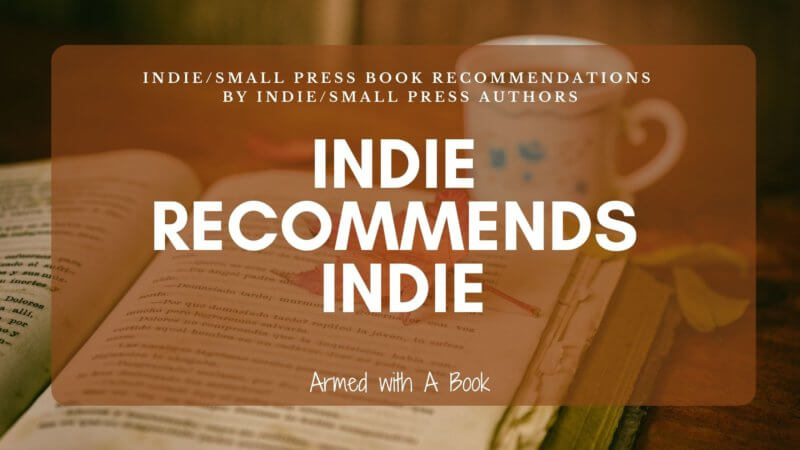
Raina, welcome to Armed with A Book! Since it’s your first time on the blog, can you please tell me and my readers about yourself?
Hello! I’ve been reading and writing fiction (almost entirely fantasy) since I was eight years old (I am dyslexic, and that is when reading suddenly “made sense”). I have loved dragons and volcanoes for probably even longer. My interests include philosophical and spiritual issues and themes, so I also love to see those in books, and relationships, though I’m not particular to romance which is sometimes equated with those! Oak trees and mountains and pine forests … giant balls floating in space … stars in the sky … rivers and oceans … these are all my kind of magic!
Do you primarily read indie books or big publishers books as well?
Indie. Definitely. Most months, I don’t think I read any trad. I read three or four trad books total last year. At this point, except for occasional exceptions, I pretty much only read trad by authors I already know these days. I’ve found indie … well, it’s much easier for me to find what I like and not be horribly disappointed by indie authors. So I’d say on average probably 90% of what I read is indie.
Raina’s Indie Recommendations

Wistful Ascending by JCM Berne
Space Fantasy
Published 2020
Hybrid Helix #1
The il’Drach Empire spans half a galaxy, built on the feet and fists of their Powered hybrid children.
At eight Rohan of Earth learned that he was only half human. By sixteen he was an active superhero, using his inherited powers to fight crime, in mask and spandex. At twenty-two he left his home to fight for the his father’s people, expanding the il’Drach Empire and protecting it from local and interdimensional threats. At thirty-two, exhausted by ten years of ruthless warfare, he retired to Wistful, a vast sentient independent space station, to try to live a normal life.
With a steady job, someone far out of his league to date, and the most cosmopolitan selection of fine dining in the sector, things are looking up.
Then a long dormant wormhole in Wistful’s system is opened by a ship full of refugees, drawing unwanted attention from the Empire. The appearance of the refugees sets off a chain of events that will force Rohan to confront his checkered past and cast doubt on whether he can ever leave behind his violent warrior heritage.
To keep his friends safe, and himself in one piece, Rohan has to face giant insects, body-skipping assassins, vengeful armored aliens, an inquisition of intelligent bears, and a team of his fellow hybrids. The open question is whether tapping into his savage alien powers will end up destroying the peaceful life he has been trying to build.
Wistful Ascending is a fun kind of story. It’s fantastic in a far-fetched way that meant I didn’t mind the sci-fi elements, like AIs or a lot of other things. It’s not the biggest reason that I rarely read Sci-Fi, but I didn’t even notice things like faster-than-light travel and go “WHAT?!” at them because it just felt like fantastic world-building in a space setting, instead of world-building that was supposed to have a scientific basis, and it was kind of fun.
Ordinarily, I don’t read books that are as action-oriented as this one, but I thoroughly enjoyed it and found Rohan’s personal goals and struggles relatable, without the action or the taste of the setting detracting from either. Instead, it was a fun setting for a character-driven story that has some more to it, without (I think?) being the kind of feelings- or thought-provoking that keeps you up at night considering your own motivations or what you think about human nature.
There’s a sort of “Slice of Life” feel to Rohan’s life and desires. He just wants to be a human being, and that was something I found highly relatable. I liked how his situation, his past, and his desires are brought out in a way that makes him feel real and very human, like these are human struggles and wants, and there’s a depth of human responses. Anonymity has its downsides, and some situations cause him to sort of miss the terror he inspired before. Here’s a man with a past that’s full of destruction just trying to get away from that and have a life. He has no fashion sense and just does not care, and in a lot of ways he’s figuring out what he wants. Everything combined to provide a sense of empathy with him, his struggle with the Anger that rises in him because of his half-il’Drach heritage and the Power that it brings, his desire to live a good, quiet life and maybe make some friends. He claims to be stupid, with a head that is rather un-useful, yet in fact he thinks a great deal, on a great many different levels, from how to fight (something he’d rather not have to do any more of if he can help it) to more social endeavors or solutions. He feels or considers that he deserves to die, having committed a great many atrocities of destruction in the service of the il’Drach Empire, yet it is just that: a consideration. Nothing like a deathwish, or even shame that overshadows every waking moment. He enjoys being alive, and he would like to continue being that way.
And one of the things you get a sense for throughout the book is that Rohan is very human, and also very exceptional in a lot of ways. He’s got immense power, and his kind are used by the pure-blooded il’Drach as “weapons of mass destruction,” having been taught a philosophy of life to make them amenable to that, one full of glory and honor and all such nonsense. Rohan has always thought, and he’s always not really wanted to wantonly destroy things, so even though he’s done some pretty atrocious things, he’s also not done atrocious things most others would have. And, perhaps because he’s always thought (we don’t really get told all the reasons behind everything in his past), he’s been given some jobs expected to kill him, that he survived because he does think, instead of just “going out in a blaze of berserker glory.”
Something I really liked about Rohan was his compassion. He might experience a great deal of Anger that can seriously get the better of him when he has to tap into the fullness of his Power, and he’s just trying to live as normal a life as he can manage, but he’s really got a lot of compassion. A great deal of kindness. He genuinely cares about others, even if that does not lead to getting what he wants. He might not say that, but he knows what the meaning of love is. I really enjoyed how that was touched on in the book, and on the complexities that can arise in relationships and decisions even when – perhaps especially when – people genuinely care about each other.
I would recommend this book to anyone who really likes character novels, don’t mind or enjoy a bit of action and non-gory violence or a space setting, is okay with some dirty humor, and wants to read about flawed people who are pushed to their limits, but who really, genuinely, want to be kind. If you like to read about really powerful characters, this one is good for that, too!

Asrian Skies by Anne Wheeler
Psychological Sci-fi
Published 2017
Shadows of War #1
Avery Rendon is weeks away from realizing her dream as a Commonwealth fighter pilot when planetary politics intervene. Reluctantly, she returns to her home planet of Asria, still hoping to break free of her controlling family and their faith. Not much has changed on Asria though, and after her almost-fiancé walks out on her, she’s not sure life can get much worse.
She’s wrong. When the Haederan Empire invades Asria, intent on rebuilding their interstellar domain, Avery becomes a target. She also becomes something else—a Commonwealth intelligence officer. It’s not long before she stumbles upon information that could change the course of the war, and suddenly she’s on the run, forced to confront her fear of death and her lingering doubts about her faith’s teachings.
Swept up in something more dangerous than politics or flying, Avery begins to wonder if her destiny lies somewhere closer to home. If those old beliefs are worth clinging to. And if she’ll live to see the end of it all.
Asrian Skies is the second sci-fi book I’ve read (and thoroughly enjoyed) this year. In the last several months, actually. There’s faster-than-light travel, and other technological weirdness, but I seem to have grown more tolerant of that. Or maybe I didn’t really notice it, since most of the book is spent on a planet, and it doesn’t come into play most of the time.
What stood out most to me was Avery. The focus of the story is very much on who Avery is. She’s not bland, she’s not usual, and she’s refreshing in a lot of ways. There’s nothing about her that says ‘princess’, and everything about her that says ‘human being’. Her dream in life is to fly, and that felt real. I could feel her love of flying, her ambition to fly, in every flight scene (admittedly, there weren’t many). But that was not what was most important. Though I’m not sure why I’m saying that, since it’s part of an inseparable whole.
I loved her personality. Her stubbornness, her determination to live her own life. Something I really appreciated was the way that, once the Haederans take her planet, her response is handled. Her terror of death, terror of torture, terror of fear itself, is raw and almost paralyzing – side by side with a need, something deeper and truer than determination, to not sit by and do nothing. To help. Fight. Something. Terrified as she is, she can’t become an obsequious slave to that terror: it just isn’t in her. She can’t stop needling and defying her captors. She can’t let them rule her life or who she is.
Even when she’s scared most of the way to death of them.
That’s what I loved most of all. I really enjoyed her spirit. And it rings true to human experience, a message of hope and courage: no matter how great your fear, no matter how terrified you are, how deep that runs in your bones or turns your muscles to lead, that doesn’t mean you’re a slave to it. It’s there all through the book, but it comes out harsh and true when she’s in the cell, scared to death, shaking, paralyzed, terrified.
And she, basically, says no. No questions asked. No doubts. She doesn’t consider betraying what she’s been doing, however betrayed by her own mind and nerves she is, however terrified of what comes next.
And then here is another thing I like about this book: it doesn’t have any of that slightly anti-Christian, at least in the sense of ridiculing or dismissing the idea or belief in God or eternal life, or at least suggesting-that-it-might-be-wrong-to-believe-in-that, and at the same time, it’s not annoying or problematic in the way that a lot of Christian fiction can be. And it doesn’t make me think about the kinds of things I only want to deal with in rare moods that most Christian fiction does. Not that Christian fiction is the only kind that can point towards a belief in God or eternal life. But it’s most of what I find that does.
I wish I’d read Avery’s soul-bending terror, and yet the unquestioning reality of her conviction and spirit, so long ago.
I would recommend this book to people who want genuine female characters who struggle, but also have a real strength to them that isn’t based on a stereotype. Also, I would recommend this book to anyone who thinks they are capable of handling it, and is terrified of their own fear.
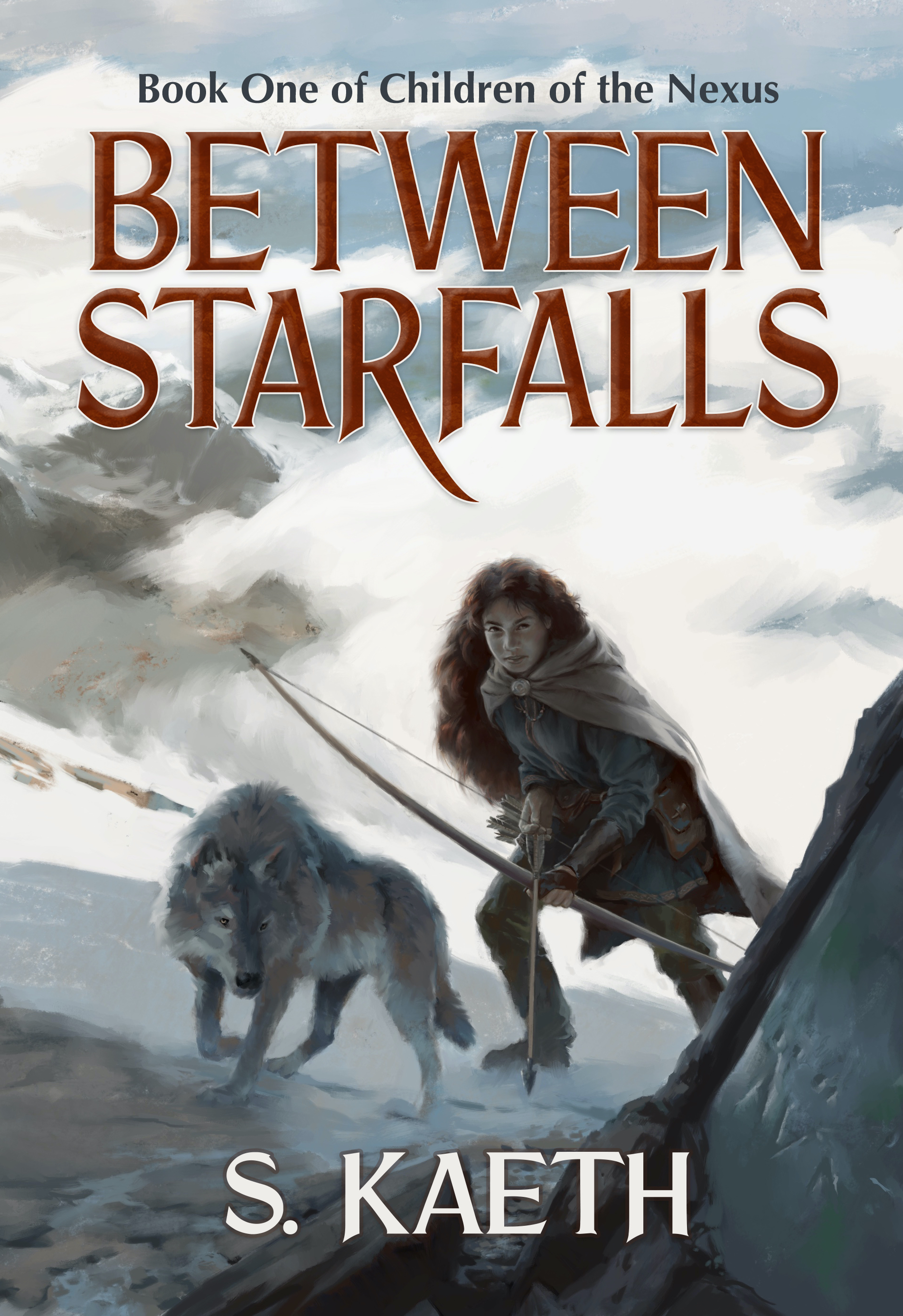
Between Starfalls by S. Kaeth
High Fantasy
Published 2020
Children of the Nexus #1
Never leave the path.
It’s sacred law, punishable by exile.
When her son goes missing in the perilous mountains, Kaemada defies the law to search for him. She enlists the help of her hero brother, a priestess berserker, and a fire-wielding friend.
But the law exists for a reason.
When the search party is captured by the mythical Kamalti, they learn that Kaemada’s son was sent to an ancient prison city. As they battle for freedom, they discover a horrible truth that will change the future of both races forever.
With their world in upheaval, Kaemada must find a way to peace if she’s to save her son—but tensions between the two races are leading to war.
Between Starfalls is a book like (almost) no other to me. The characters feel real and deep, with real personalities, but it is not that that stood out to me like nothing else, though it could not have happened without the characters! I do not think it could have happened if the story was not driven by the characters – more about Kaemada and Taunos (her hero brother) and Ra’ael (the priestess berserker) and Takiyah (the fire-wielding tinkerer), and all the people around them, and their choices, than about the “story” or anything else! I don’t think I have ever before (though I hope to again, and I have sometimes come close) read a character novel quite like this one, that deals with trauma and evil, with the horrible things in experience and in the heart and the ones that seem complicated and hard to understand, and at the same time with what I call ‘idealism’ for lack of a better term, with commitment to ideals, to hope, to convictions, with good in the same way that this one has done!
The story shows things that happen that test (and sometimes overcome) people’s commitment to who they are, their understanding of what is right. But, it never questions that there is a right. I really liked this! I almost never see it like here! The difficulty, the pain, the horror, confusion, uncertainty, doubt, despair, brokenness, sorrow, heartbreak – all are presented in a raw, true way, true to experience, but at the same time there’s not the suggestion that there is no right or wrong, that ideals are just ash to be blown in the wind. Instead, there’s holding on to them as well as one can see how in the midst of challenge, recovering and discovering them again.
Something else I appreciated was the presentation of a primitive society and people. I thought how the world – and how a civilization – might look to such a primitive people was well-represented and suggested. The song of the spirits, the way the Rinaryn think of their priestesses and about religion – that it is the business of each one to find the way for him or herself to worship Eloì and no one can teach another – all of it was interesting, and I thought appropriate. I enjoyed the setting thoroughly. It was also interesting the setting of a people who were once civilized, living in cities with terrible weapons, who rejected that to live in harmony with the song of the spirits and nature. Everything really made a lot of sense and fit in a very poetic way, but also there were some group dynamics that cause trouble everywhere, whether people are civilized or not, that made sense. It was very, very rich.
The characters are very real and authentic. I could talk about all of them, but I will start with Kaemada. Her hopes, her dreams, her courage and determination, her love for Eian, and her insecurities – they all form very much the shape of a unique person, and it was interesting and insightful to read about someone like her. She has a lot of very strong feelings, and she is very loyal, and she is committed and very good-hearted. She is kind, and she believes that things are good, wants to make things better, believes that it’s possible to make things better and for people to be good, and she keeps trying and returning again and again. I really liked Kaemada. I liked Taunos and Ra’ael and Takiyah, too, and they also are very real, awesome characters, but if I talk about how I liked all of them, I am going to so-called “spoil” the book (though I don’t see what this process or result would have in common with spoilt fruit, rotten eggs, or anything else of that sort). I liked other characters too, like Maeren, the Saimakhae or Great Mother of the kaetal (the community of the Rinaryn).
I would absolutely 100% recommend this book to anyone who wants a character-driven novel with cool, original world-building that, above all else, is both idealistic, not questioning the reality or worth of values like truth and kindness, but that at the same time does not shy from the challenges that this world presents to living according to your values!
📖 Check out my review of Between Starfalls here. Many authors on Indie Recommends Indie have loved this book, the last recommendation coming from Lindsey Bakken. 📖
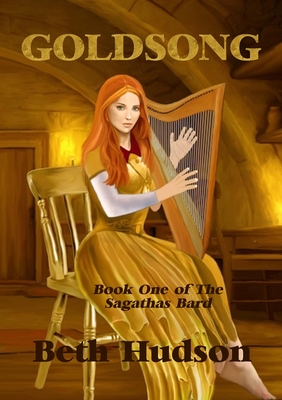
Goldsong by Beth Hudson
High Fantasy
Published 2020
Part of a Series
A reluctant king. A legendary harp. A city divided.
Traedis Atenel never expected to find herself a king. When she fled her city and her family, all she wanted was to become a bard and make her own way in the world. Now, touched by strange magic and harrowed by imprisonment, she rules the city she once hated.
Despised by its people, she embarks on a mission to reform what was once known as the City of Assassins. After all, she has spoken with gods, walked with dragons, and learned the mysteries of bardic magic. When a demon comes calling, it reawakens a curse that could destroy Traedis and her city.
Supported by her sister Vandeyr, a former assassin, and with the aid of an enchanted harp, Traedis uncovers long-buried secrets and forges alliances where she least expects them. But elemental spirits, ghosts, and hostile powers stand in her way. Some of them will help her. Some will oppose her.
Some of them are certain to be from her own family.
Traedis is a kind, courageous, generous, pure-hearted character. I enjoyed her simplicity and heart and her firm resolution to do what she sees as right, as good, no matter what the obstacles or arguments are. Though I found how overwhelmed by her family she is, even after all the time she has been away from them, to be slightly jarring. Traedis’ reluctance, if not inability, to actually wish or have harm done to her family is an important part of who she is, but it is a little old how she feels the desire to defend or stand up for her Uncle Cordelayne, as if he had no flaws, even though he’s done so much evil to her and she is trying to thwart him. However, it’s not as if her past is unreal and disconnected from who she is in the present. Her responses might not be those most people would expect from someone who has endured what she has, but she’s an integrated person and those experiences are part of her and her reactions and habits.
Goldsong is a book where some of the characters have darker shades to them, where people can be complicated or quite messed up or even evil (not that any of these is either-or), but where there is a fundamental goodness, a simplicity and purity that does not equate to one-dimensional or undeveloped characters. Where that simplicity and goodness is not a mark of inexperience or ignorance, but can face and grow through even the horrid things that happen, like a long, long lonely imprisonment or curses and some of the other things that happen. And the people, like Traedis, might not be perfect (is that a judgment that should even be made?), but there is a simplicity and purity to their goodness, a fundamental, unclouded goodness to their hearts. This is perhaps my favourite thing about Goldsong: Traedis’ unflinching determination not to compromise.
I really felt like there was a depth and truth to the characters. Sometimes I didn’t understand them, sometimes I wished I knew more about them or understood them better, but they felt like they were themselves, and it never felt like staying true to the characters was traded for plot or writing.
Picking up the book felt like picking up in the middle of a book or a series. Traedis has a huge back story of growth, development, and learning. I didn’t mind (notably, I often read series backwards or haphazardly, and I read books half-backwards just as often), but I did think it would have been helpful to have a “Previously” section like people sometimes put in sequels, even though this isn’t a sequel. At least a time line of important events in Traedis’ life could have been helpful.
Goldsong has a somewhat interesting plot structure. It starts in the thick of things (with Traedis newly made king), but it seems to have two primary plotlines going somewhat concurrently, one of which is resolved relatively early.
I really enjoyed the world-building and setting. It has a lot of depth and meaning to it. It’s very layered and full, encompassing the whole world. An example is the falmyros, the magic that ties the king to the land and gives the king knowledge of the land and the power of the land, and that makes Traedis the King of Tolin. I really enjoyed the music-based spellcraft of Traedis, her harp and her bardic spell-weaving. It was very interestingly done.
The world-building was also very beautiful, and full of creatures. The Great Air Dragons, and the Star Cavern, and there’s the King of Winter and Traedis’ blessing from him. I just thought it was really beautiful and inspiring.
I would recommend this book to those who love rich world-building that feels like the world is thick with mythical creatures and the magic of folklore, to those who like clean fantasy, to those who want pure-hearted main characters who surmount the challenges before them by staying true to their ideals, even when that seems to be fatal.
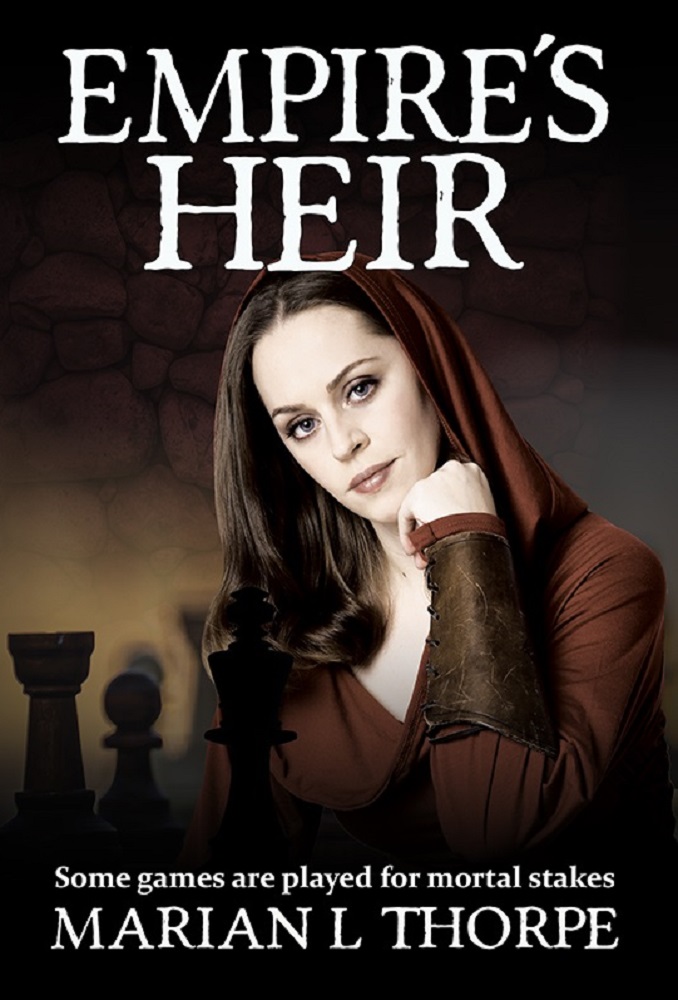
Empire’s Heir by Marian L Thorpe
Historical Fantasy
Published 2022
Empire’s Legacy #6
Some games are played for mortal stakes. Gwenna, heir to Ésparias, is summoned by the Empress of Casil to compete for the hand of her son. Offered power and influence far beyond what her own small land can give her, Gwenna’s strategy seems clear – except she loves someone else. Nineteen years earlier, the Empress outplayed Cillian in diplomacy and intrigue. Alone, his only living daughter has little chance to counter the Empress’s experience and skill. Aging and torn by grief and worry, Cillian insists on accompanying Gwenna to Casil. Risking a charge of treason, faced with a choice he does not want to make, Cillian must convince Gwenna her future is more important than his – while Gwenna plans her moves to keep her father safe. Both are playing a dangerous game. Which one will concede – or sacrifice?
Empire’s Heir is dual PoV, written through the eyes of Gwenna, and her father Cillian. I’ve been really interested in Cillian for a long time, so it is nice to get some of his perspective. Family and relationship struggles, grief, and duty/responsibility are all themes that rear their heads, in this story about Cillian and Lena’s family and the challenges they face.
Something I really enjoyed is the way those interpersonal conflicts are raw. Cillian loves Lena dearly, and she loves him, but there are things between them, things Cillian has done that could drive them apart, as well as issues and needs that Lena has. It’s a story of a family with issues any family might have, and also issues most families might not (or are they human issues, everyone experiences to a greater or less degree, in more or less obvious ways?). Of oaths sworn, and what it means to keep them before those you love. Of responsibility and duty, and what you believe to be your responsibility, and what is not. Of human fears and concerns and responses, Lena’s belief that the goddess to whom she prayed for victory in a battle is responsible for the death of her youngest child, and the different responses of everyone in their family to grief. How, in their different responses to grief, they sometimes hurt each other very badly without meaning to, and try to comfort each other.
Of how people grow and change, and what once was stable may not be permanent, and a new stability has to be found.
I enjoyed the treatment of relational issues that don’t have an easy solution, and the anguish that causes among people who are trying to love each other. How other people are hurt when those they love have problems with each other, and what it requires to work through those problems in a way that’s loving. The journey of two people discovering what love is, and what the nature of the relationship and love between them is.
And perhaps my favourite thing about the book was the dynamic between Gwenna and Cillian and the Empress (and her son). Cillian has sworn to Lena that he will not let their children becomes pieces in the game of empire, and they had impressed upon Gwenna that she is to marry because she wants to, for love. She is not to consider herself bound to marry someone she does not want to for the sake of empires. That is not her duty. But with the Empress, Eudekia (I can say I did not like the Empress – this is cruel!) leading her to believe that her father will be killed if she does not marry her son – who she finds to be a fine intellectual partner, but whom she does not love, while she may love someone else, who most certainly does love her – Gwenna is prepared to make that choice. And she follows in her father’s footsteps of lying to those around her, at least in the sense of withholding salient truths, not willing to burden them with her choice. So it takes a while for Cillian to figure out what is going on.
One of the things I really liked about this book was Lena and Cillian’s focus on Gwenna’s freedom to love who she wishes. This is a series that definitely has a bit to do with duty, but that is something that is so refreshing to see, that emphasis on freedom and love. I don’t think this is a series or a book that strives to provide answers to all questions, only to show possibilities and provoke thought. And I liked that that emphasis on freedom and love is shown in this book, since it is something I rarely see, and it provides a balancing view, a balancing thought to be considered, against the expediency shown in some other places throughout the series.
I would recommend this book for people who like slow-paced books that are low on action, but center around deep, organic characters and character relationships, with thoughtful attention to complex issues of relationship. Also, a perfect fit for anyone who likes worlds that are strongly based on historical inspirations, but set in a secondary world.
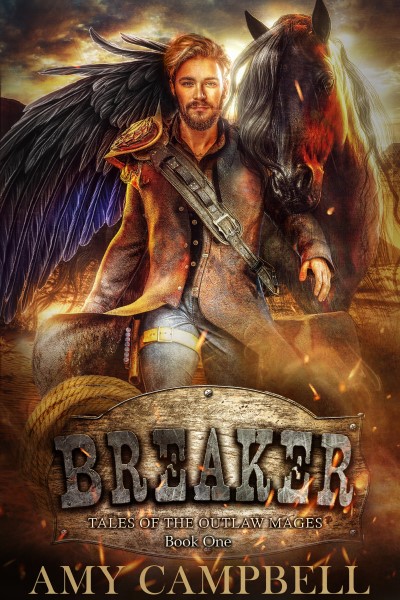
Breaker by Amy Campbell
Fantasy
Published 2021
Tales of the Outlaw Mages #1
Unless this outlaw mage tames his magic, everyone he cares about will be crushed by the enemy. Blaise Hawthorne fears that all he’ll ever be is an outcast, stuck living with his parents for the rest of his days and unable to realize his dream of working in a bakery. Born a Breaker, his unbridled magic wreaks havoc with a touch of his hands. When an enemy Commander storms into his town in a cloud of dust hunting for spellcasters, Blaise escapes and flees the only life he’s ever known.
While on the run, Blaise’s chance encounters with a pegasus and a surly gunslinger set him on the path to a new life where he’s accepted for who he is. But things go awry in his new town and Blaise is suspected, forcing the terrible choice between taking the blame or running from the only people who embraced him. When his chosen family is threatened by the Commander he thwarted, can Blaise find the grit to harness his volatile magic into a saving grace, or will his most dangerous challenge be his last?
This gritty, uplifting fantasy is the first book in the Tales of the Outlaw Mages series, set in an Old West-inspired world. If you enjoy found family, LGBTQ+ representation, baked goods, and a whole lot of heart then look no further. Break away from the beaten fantasy path with Breaker today.
Blaise is a very kind-hearted shy main character, made all the more inclined to tuck his tail between his legs and try to hide by his past, where his magic has constantly caused problems and made him seem to be a problem or useless. The story is very, very character-driven; the plot is about Blaise, what happens to him and how it makes him feel, grow or not grow. His homesickness and loneliness when he flees from his family and town when the soldiers of the Salt-Iron Confederation come looking for mages, the way he reacts to the menace of others, like Wildfire Jack, his love of baking, his shyness to bring forth anything he might not do adequately to the expectations of others, Blaise’s constant urge to understand, to be kind and give others – even if they’ve hurt him, even if he’s afraid of them – the benefit of the doubt, of trying to understand why, his responses to everything that happens, are all at least as much a part of the story as anything else, as the things that happen.
Nonetheless, there were times when the writing felt lacking in some way, as if pushed into an external shape. No one did anything out-of-character and it was not that there were any plot holes or that it stretched believability. It just lacked that touch at times, that immersion, like it was not written from an intimate understanding or following of the characters particularly the main character, but from what was “supposed to happen.”
I really liked how all the characters were considered. Sharing the details here would be ‘spoilers’ if I am capable of making any judgments as to what is a ‘spoiler’, but I will say I liked how the motivations and complexities of people’s actions were shown. It’s not at all grimdark, there are definitely “good guys”, people whose motivation is pure and kind-hearted and who don’t do evil things, but a lot of people who seem to be “bad guys” on casual inspection turn out to be a lot more complicated than that, not so much “bad guys” as people forced into very difficult situations, and there’s a lot of openness in who they are and their stories.
Also, I wished there more of Emrys, the pegasus. It’s so sweet the way Blaise rescues Emrys when he is in need himself, and it’s just how sweet how protective of Blaise Emrys is. But I felt like there should have been more about Blaise and Emrys, like Emrys should have had more of a place in the story and in Blaise’s thoughts and feelings. There wasn’t enough of the black pegasus.
PS. And the sequels are even more awesome! I beta read the newest one, Persuader, and it is FANTASTIC in so many ways!
I would recommend this to anyone who loves cinnamon roll characters who struggle, but are not broken or presented as naive or less than the tough guys, and to anyone who loves animal companions or magical equines in adult/older YA books.
Raina’s Book Spotlight
Heart of Fire
High Fantasy; Coming April 2023
Dragon-mage # 1
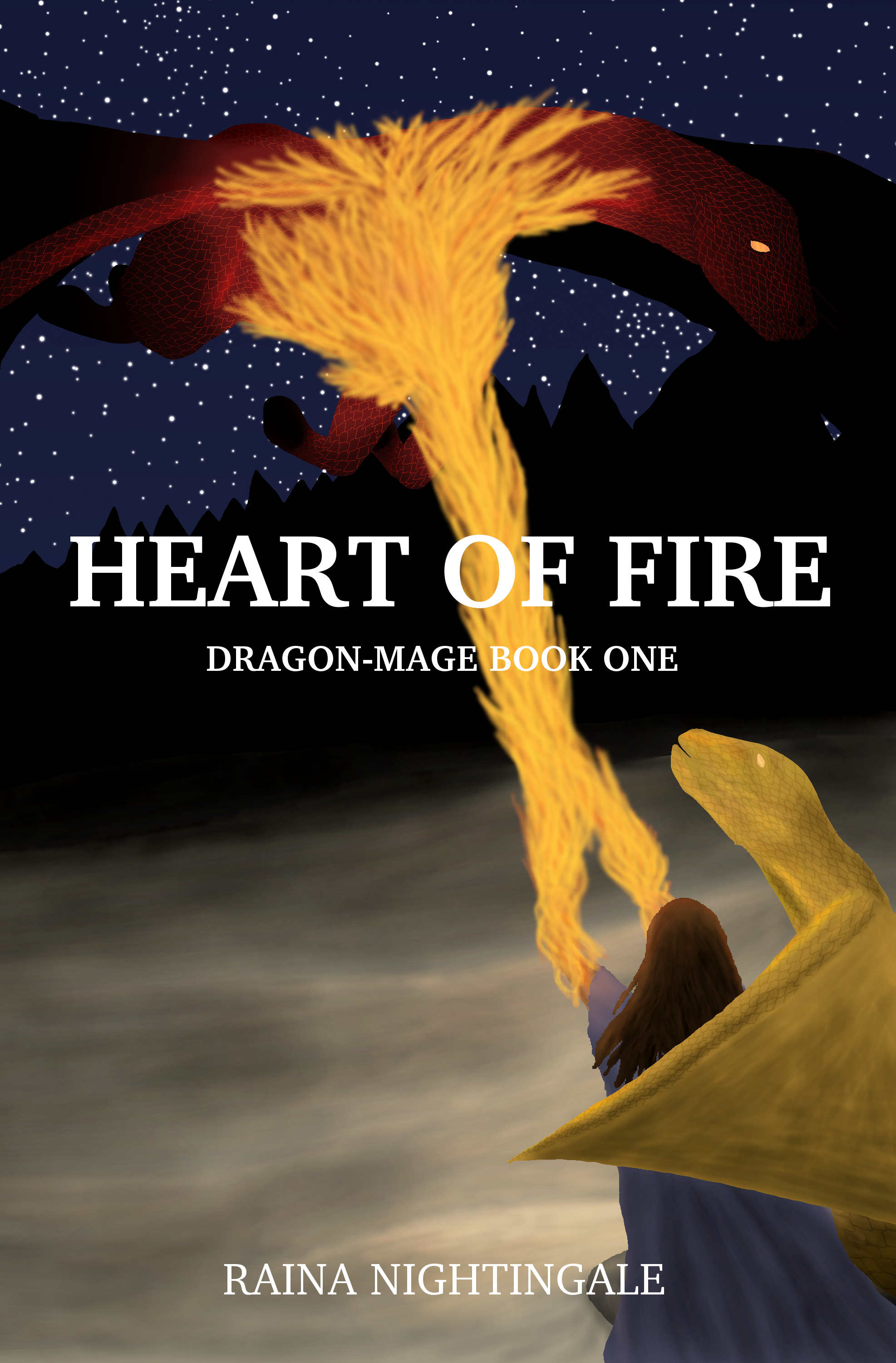
A SLAVE DETERMINED TO RIDE A DRAGON. A CHILD CHOSEN TO RIDE THE OBSIDIAN GUARDIAN.
Camilla has always been told that humans are inferior. They cannot use magic. If they bond to dragons, they will doom the creatures to extinction. She has never believed a word of it. She has always known that she can use magic, and she suspects it is the elves who harm the dragons by keeping them to themselves. Now, she is presented with the opportunity of a lifetime: a dragon’s clutch is hatching and while she will earn the wrath of her captors if she is caught, she has the chance to see a dragon hatch and perhaps even to Recognize.
Kario’s people have feared dragons since time immemorial. When an unrealistically huge black dragon flies in while she is hunting, she is certain she will die. Instead, her life is changed when Nelexi, Obsidian Guardian of Areaer, chooses her as her final rider. Kario takes the name Flameheart, but she is soon homesick and afraid that she is insufficient to be the partner of a god.
Readers who like the magic in Goldsong andenjoyedthe Valdemar novels by Mercedes Lackey, such as The Last Herald-Mage and Mage Storms, and would prefer the same depth in the relationships between the characters, without so much romance and sexual content, will love Heart of Fire.
If you know anyone who would be interested in ARC reading Heart of Fire, please ask them to reach out to Raina. You can use the contact form on my website’s home page. If you are a registered book blogger on IndieStoryGeek, you can also find review copies there!
Did you add any books to your TBR today based on this post or did you see any you have already read? Tell us in the comments!
Thanks for hanging out with us today! Connect with Raina on Twitter and her website. Sign up here to be notified whenever she has a new book.

If you are an indie or small press author who is an avid reader and wants to be featured, sign up using the form on the Indie Recommends Indie home page. This is a fantastic way to bring attention to fellow indie authors as well as your own book. 🙂
Banner Photo of library by Alfons Morales on Unsplash

Be First to Comment